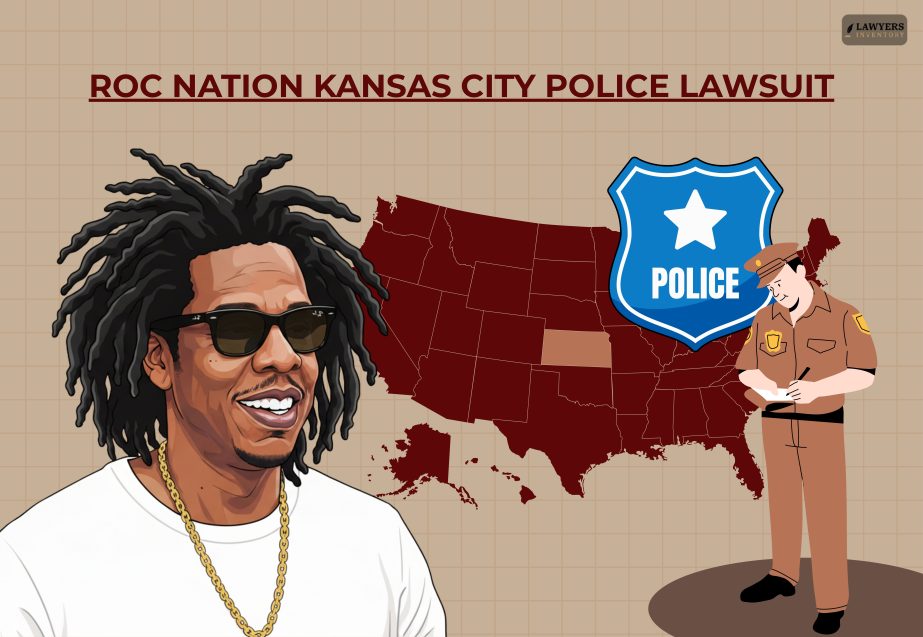
Today’s topic: ROC Nation Kansas City Police lawsuit.
In 2021, Jay-Z’s Team ROC brought a suit against the Kansas City, Kansas Police Department (KCKPD) alleging that the department was engaged in a cover-up of police misconduct. They had filed the lawsuit in the Wyandotte County District Court.
Team ROC brought the suit against the local police department to get hold of the police records. According to the lawsuit, their aim was to determine the extent of the misconduct and assess the sufficiency of the KCKPD’s training and supervision.
According to NBC News, the lawsuit states that instead of facilitating a culture of openness and accountability, “the KCKPD has a long history of turning a blind eye” and, in some cases, protecting the officers who have engaged in abusive and/or corrupt conduct.
Team Roc demands justice for a lot of the residents who claim they were treated poorly for decades, and cover-ups took place.
The ROC Nation Kansas City Police lawsuit has far-reaching effects beyond the city limits. This case is a national blueprint of private parties demanding change in the public sector and access to government truth.
In this article, we will break down the following things:
- What is Team Roc?
- Background to the ROC Nation Kansas City Police lawsuit.
- About Detective Roger Golubski.
- What was the role of Team Roc in the lawsuit?
- Legal proceedings and challenges in the ROC Nation Kansas City Police lawsuit.
- The current scenario and update related to the lawsuit.
Therefore, if these are a few things that you want to know, keep on reading this blog till the end…
What Is Team Roc?
Team Roc is the social justice and philanthropic division of Roc Nation, the entertainment company founded by Shawn “Jay-Z” Carter.
Roc, through this department, is directing the advocacy, humanitarian relief, and systemic reform efforts in areas that have been historically marginalized with the help of its resources.
Amplifying civil-rights issues, invigorating the grassroots movements, and being the driver of the social change that can be measured are the core of the mission of Team Roc.
Besides that, Team Roc always works together with the partners in the legal, corporate, and nonprofit sectors to present the injustices and to provide the money for the targeted interventions. Their presence is seen in the campaigns for the reform in the criminal justice system, the initiatives for the community aid, and the national awareness efforts.
First of all, the said organization, in the past few years, boasts of having reached over 5.17 million people through their programs while at the same time, they have been able to rally a huge amount of financial support for projects that have a positive impact on society.
Moreover, the leadership within Team Roc has been honored and recognized with several awards on the national level for their contributions to social justice and reform-focused advocacy.
Background Of the Kansas City Police Misconduct Allegations
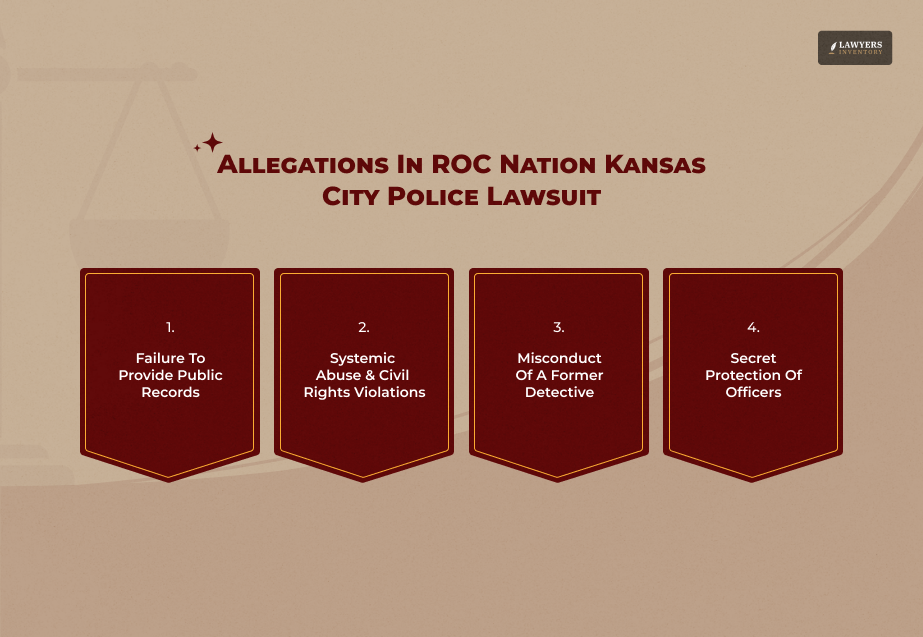
The ROC Nation Kansas City Police Lawsuit did not occur in isolation. The lawsuit followed decades of appalling allegations against the KCKPD. Notably, the allegations leaned towards corruption, compromised evidence, and a culture of impunity. The community had been voicing its pleas for intervention and an end to the systemic issues within the department long enough.
The Kansas City, Kansas (KCK) police misconduct involves numerous preceding incidents and decades of corruption, excessive force, and civil rights violations, mainly affecting the actions of former detective Roger Golubski and the entire department’s dysfunctions.
The Roger Golubski Case
Roger Golubski is a former detective of the Kansas City, Kansas Police Department who was operatively promoted to the post of captain before his retirement in 2010. He is the primary accusation being made against KCKPD.
He has been accused of misusing his power for the exploitation and abuse of the Black community in Kansas City over a long period.
Here are a few things that you need to know about his case:
- Sexual Assault and Extortion: Several Black women have charged Golubski with sexual assault, rape, and kidnapping, often in return for not imprisoning their family members or as part of a “police protection racket. Victims recounted that he would say “Because I can” to justify his misconduct when they asked him why he was misusing his power.
- Wrongful Convictions: Golubski was found responsible for the false conviction of Lamonte McIntyre, who spent just 23 years in custody for a murder he did not commit. McIntyre’s mother claimed that Golubski set her son up after she turned down his sexual advances. McIntyre’s release in 2017 opened the door for more people to hear about the allegations and pushed the FBI to investigate Golubski.
- Federal Charges and Death: Golubski was charged with six federal civil rights violations regarding the sexual assaults of two women in 2022. He committed suicide in December 2024, on the very day the trial concerning his federal charges was set to start, meaning the victims were never given the opportunity to face him in court.
Systemic Issues And Investigations
The allegations are not limited to Golubski, but rather indicate a KCKPD culture of cover-ups and no accountability at all:
- “Giglio List” Leak: A significant data breach of KCKPD files in 2024 revealed a covert internal “Giglio List” with the names of 62 officers whose credibility could ruin prosecutions. The “Giglio List” records disclosed different kinds of misconduct, for example, sexual relationships with informants, domestic violence cases, and excessive force. It was common that the officers listed on the “Giglio List” were either allowed to stay on the force or were fired, then reinstated after a period of time.
- Federal Probes: KCKPD has been the subject of FBI investigations for many decades. The disclosures from FBI operations in the 1990s included allegations of police beating of Black people and police involvement in drug trade. The same activists who filed the lawsuits and the social justice organization Team Roc founded by Jay-Z, have been calling on the U.S. Department of Justice to carry out a wider “pattern-or-practice” investigation into the whole of the KCKPD department’s unconstitutional practices.
- Civil Lawsuits: The Unified Government of Wyandotte County and Kansas City, Kansas, has been no stranger to civil lawsuits from victims claiming the city and police leadership knew about the misconduct but chose to ignore it and even facilitate it.
These allegations are still carrying their consequences, and the victims along with the activists are demanding more accountability and systemic changes in KCKPD.
The Role Of ROC Nation’s Team ROC In The Lawsuit

Roc’s squad, founded by Jay-Z, focuses on social justice and activism. The organization generally advances individuals and societies that are fighting systemic oppression. Forging into the Kansas City legal community was a strategic move to maintain transparency.
They entered the fight to help victims who believed they had no other means of recourse against a firmly established, powerful police establishment.
1. ROC’s Strategy
Team Roc’s strategy in the ROC Nation Kansas City Police Lawsuit was simple but effective: ask for public records. They asked for records of the investigations by Roger Golubski and the general policy of the department. These were requested under the Kansas Open Records Act (KORA). Public access to them is the essence of government transparency for the public.
By utilizing KORA, Team Roc aimed to make the KCKPD reveal information concealed for decades. The documents helped validate claims of misdoings and corruption. Transparency is the main objective of the ROC Nation Kansas City Police Lawsuit.
The organization has invested a lot of resources in the case. The case demonstrates how celebrity-backed activism can provide resources to local civil rights struggles.
2. Advocacy And Community Support
Team Roc’s involvement provided more than legal clout. It drew international attention to what had been a local, seemingly insoluble issue. That outside pressure was a key part of the strategy.
It enabled the discussion to move from a chain of individual crimes to one of systemic KCKPD corruption. The campaign has been an example of successful community activism supported by celebrity intervention. This approach lifts the level of voice of those most immediately affected by police abuse.
Legal Proceedings And Challenges
The ROC Nation Kansas City Police Lawsuit legal process was problematic and complex. As in so many prominent legal battles, the case was confronted by initial hostility from the municipal defendants.
The legal grievances and ensuing court responses articulated the difficulty of suing a government agency for historical abuse.
1. The Statute Of Limitations Hurdle
Among the most significant legal issues facing the ROC Nation Kansas City Police Lawsuit was the statute of limitations. This is a legal principle that places a time limit on the bringing of a lawsuit following a claimed violation.
The case initially was dismissed by the district court based on arguments that the accusations of wrongdoing were outside the legal time period (KCUR). This was according to the chronology of the first offenses.
2. Continuing Violation Doctrine
Team Roc and their lawyers, Jenner & Block, were adamant in their opposition to this decision. They set forth an argument called the “continuing violation” doctrine. That is, the statute of limitations should not start until the systemic, harmful practice of the KCKPD’s perpetual refusal to comply with public records laws finally ends.
The legal team contended that the city’s perpetual failure to adhere to KORA requests justifies rightful grounds for the ROC Nation Kansas City Police Lawsuit to be adjudicated in court. The appeal has focused its attention decidedly on this technicality of the law to attain justice despite the passage of time.
The Ongoing Struggle For Discovery
Despite being on appeal, the judicial struggle continued over the discovery and production of records. Every legal document filed by Team Roc emphasized the idea of police openness. They argued that the public should be allowed to see the department’s internal records of its probes.
The defendants, however, asserted that the production of some documents would compromise ongoing investigations or invade personnel privacy.
This tug-and-pull underscores the underlying conflict of the ROC Nation Kansas City Police Lawsuit of government secrecy versus public accountability.
Community Response And Public Engagement
The ROC Nation Kansas City Police Lawsuit affected the local community. It showed how residents, especially those from marginalized communities, had felt powerless against the KCKPD for a long time.
Thus, the intervention by Team Roc provided them with a powerful outside validation of their claims. The intervention conveyed the message that their situation was being heard nationally.
Public Demand For Responsibility
Public demonstrations and protests in Kansas City vindicated the aims of the lawsuit. Civil rights organizations, including ACLU Kansas, freely came out in favor of Team Roc’s efforts. The suit became a rallying point for the greater cause, insisting on policing reform and greater accountability.
Publicity to the ROC Nation Kansas City Police Lawsuit ensured that the local fight was being heard all across the nation. That attention pushed city leaders to be forthcoming in their response. Trust among the public is founded on record integrity.
The ROC Nation Kansas City Police Lawsuit is driven by the public’s perception that the KCKPD had failed to protect and serve. It is the public’s demand to hold KCKPD accountable to the fullest extent.
Expert Analysis And Legal Perspectives
Legal observers consider the ROC Nation Kansas City Police Lawsuit to be a central case study of public sector transparency.
The lawsuit entails less recovery of financial damages for what happened in the past and more coercive systemic change by way of disclosure of records. This is an unconventional and coercive legal strategy in civil rights lawsuit actions.
Challenging Sovereign Immunity
One of the more significant implications of the ROC Nation Kansas City Police Lawsuit is that it defies sovereign immunity. This area of law generally insulates government agencies from suit.
The lawyers representing Team Roc are attempting to pierce this armor by asserting that the continued refusal to provide records constitutes an actionable tort, independent and apart from the initial misconduct complained about.
This is a legally operative distinction. If it is won, the case would make it easier to hold city governments accountable for their frequent failure in court.
Broader Consequences For Police Reform
The result of the case will have an important precedent. It will make it more difficult for government agencies to use legal mechanisms like the statute of limitations to circumvent accountability to the public.
Specialists are of the opinion that the underlying struggle, access to records, is integral to real reform.
If Team Roc wins, the ruling will give power to activists throughout the nation. It would affirm the reality that patterns of recurring noncompliance with public record law can, in and of themselves, serve as a basis for lawsuits.
Ultimately, the ROC Nation Kansas City Police Lawsuit is a major push toward police transparency and police reform in the United States. This legal action defines how communities demand accountability from their law enforcement agencies in the future.
Frequently Asked Questions (FAQs):
The ROC Nation Kansas City Police Lawsuit is a turning point in the national conversation on policing and transparency. This legal war is staggering.
Moreover, the lawsuit has already reached the significant goal of placing the decades-long corruption accusations in the national spotlight. The fight for justice and the demand for open records remain in Kansas City.
The main goal of the ROC Nation Kansas City Police Lawsuit is not to win money, but to get the KCKPD to provide public records. Team Roc is using the Kansas Open Records Act (KORA) as a means of compelling transparency.
They seek to bring forth the magnitude of the alleged systemic corruption and abuse of authority. This is particularly true in the instance of former Detective Roger Golubski, for accountability.
Government agencies frequently employ the statute of limitations to exclude suits for ancient misconduct. The defense argued that the period of suit had long since expired on numerous of the alleged ancient occurrences.
Team Roc objected that the KCKPD’s persistent failure to produce public records is a continuous violation. Moreover, it should make the ROC Nation Kansas City Police Lawsuit a live one legally.
Yes. Following several years of civil actions and investigations, Roger Golubski was indicted on several charges by federal authorities. They are deprived of rights under color of law.
This evidence contributes to the gravity of misconduct charges. Additionally, it also informs the continuing request for public records from the ROC Nation Kansas City Police Lawsuit.


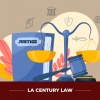





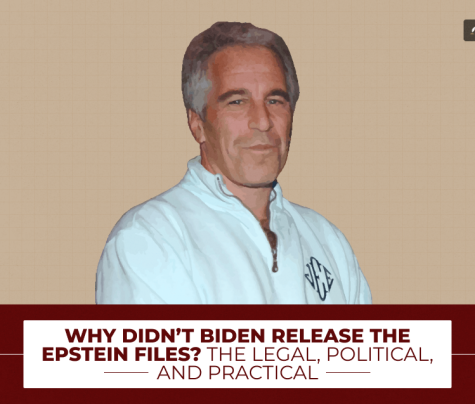
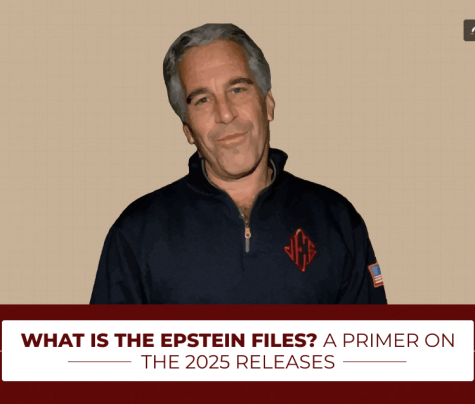


0 Reply
No comments yet.